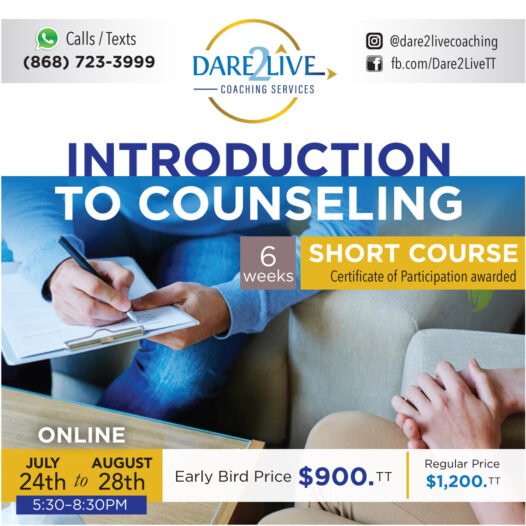Introduction to Counseling

PURPOSE OF THE COURSE/COURSE RATIONALE
- To help people deal with various difficulties of life
- To help others come up with solutions to resolve issues
- To be more equipped to offer support
- To lead others to live a healthy and rewarding life
- Understanding the role of a counsellor
- Understanding the attitudes and emotions of the counsellee
- Understanding your strengths and weaknesses as a counsellor
- To understand your limitations and know when it is the right time to do a referral
- Develop listening skills
- To learn three theories in Counseling
Past Courses
PURPOSE OF THE COURSE
The course exists to expose participants of varying disciplines and professions to the impact of grief and strategies to assist others in coping with the process of loss. The course provides theoretical and practical insight that students can apply in a family and friendship context
GOALS/AIMS
- To expose students to the basic concepts and theories of grief and counselling
- To engage in constructive dialogue/interactions with persons experiencing bereavement
- To understand the theoretical frameworks associated with grief.
- To develop an awareness of therapeutic attitudes, skills and techniques.
Understanding mental health disorders is an integral part of treating mental illnesses. Psychoeducational awareness explaining what constitutes mental illnesses, presenting symptoms of a mental illness and treatment options can help expand persons’ knowledge and help break barriers and stigmas and help champion mental health advocacy. This short course will provide insight into mood disorders, anxiety disorders, trauma disorders and psychotic disorders.
PURPOSE OF THE COURSE
The course exists to expose participants of varying disciplines and professions to understand mental health disorders and presenting symptoms of certain disorders. The course provides theoretical and practical insight into identifying mental health disorders and gaining knowledge on treatment options.
PURPOSE OF THE COURSE/COURSE RATIONALE
- To be able to define trauma
- To discuss the impact of trauma on psycho-social development.
- Identify and describe theoretical frameworks on trauma
- Discuss the impact of adverse childhood experiences on adult development
- Examine Post Trauma Stress Disorder
- To understand what is Vicarious Trauma Empathy
- Understand application of trauma interventions
Discovering Psychology
- Definition/Goals
- Philosophical issues
- Historical approaches to Psychology
- Modern approaches to Psychology
- Careers in Psychology
- Research Areas
Brain’s Building Blocks
- Neurons
- Action Potential
- Neurotransmitters
Incredible Nervous System
- Organization of the Brain
- The Human Nervous System
- Limbic System
- Endocrine System
Memory
- Types of Memory
- Storing Memories (Encoding)
Remembering & Forgetting
- How we store memories
- Forgetting
- Biological Bases of Memory
- Eye Witness Testimony
Health Stress & Coping
- Appraisal
- Physiological Responses
- Stressors
- Personality & Social Factors
- Coping
Mood Disorders & Schizophrenia
- Kinds/Causes of Mood Disorders
- Personality Disorders
- Schizophrenia
- Cultural Diversity
This course seeks to offer a basic understanding of the principles of Cognitive Behavioural Therapy (CBT) with an emphasis on personal development. CBT is an evidence-based form of psychotherapy that teaches the individual to modify problematic thoughts that contribute to negative outcomes, behaviours and mental disorders. This course will assist in understanding the various intervention skills that are applicable mainly to anxiety and depressive symptoms and improve general health and wellbeing. It is suitable for anyone in the helping profession considering adding CBT to their toolbox of strategies or for any individual experiencing depressive or anxiety symptoms and desirous of supporting their own self-development.
GOALS/AIMS
- Define Cognitive Behavioural Therapy by its major tenets.
- Develop knowledge of various cognitive-behavioural models of common psychological disorders.
- Review evidence and efficacy data available for implementation of various cognitive-behavioural psychotherapies for specific disorders.
- Students will identify and define the critical elements of a cognitive-behavioural case formulation.
- Using provided clinical cases, students will write a cognitive-behavioural case formulation using the elements of a case formulation.


